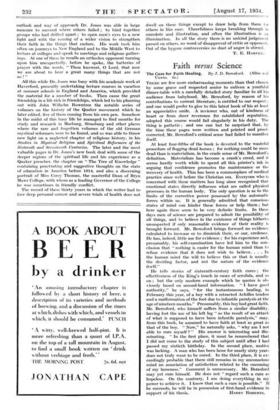Faith versus Science THERE are few more embarrassing moments than
that chosen by some grave and respected senior to enliven a youthful dinner-table with a carefully detailed story familiar to all his audience from babyhood. Mr. Beresford, by reason of his contributions to current literature, is entitled to our respect ; and one would prefer to give to this latest book of his at least an appreciative smile. A reviewer who, out of kindness of heart or from sheer reverence for established reputation, adopted this course would fail singularly in his duty. The thing is pathetic ; and one can but be surprised that, by the time these pages were written and printed and proof- corrected, Mr. Beresford's critical sense had failed to manifest itself.
At least four-fifths of the book is devoted to the wasteful procedure of flogging dead horses ; for nothing could be more dead than is materialism, in the crude sense of Mr. Beresford's definition. Materialism has become a crank's creed, and it seems hardly worth while to spend all this printer's ink in arguing that confidence promotes the maintenance or the recovery of health. This has been a commonplace of medical practice since well before the Christian era. Everyone who is concerned with these matters has long since recognized that emotional states directly influence what are called physical processes in the human body. The only question is as to the limits of the corrective power possessed by the automatic forces within us. It is generally admitted that conscious states of mind can hinder these forces or help them ; but here again there seem to be very definite limits. In these days men of science are prepared to admit the possibility of all things, and to believe in the existence of things hitherto unsuspected if only reasonable evidence of their reality is brought forward. Mr. Beresford brings forward no evidence calculated to increase or to diminish their, or our, credence. He has, indeed, little use for evidence ; for his experience and, presumably, his self-examination have led him to the con- clusion that "nothing is easier for the human mind than to refuse evidence that it does not wish to believe. . . . In the human mind the will to believe this or that is usually the deciding factor, and not the nature of the evidence itself."
He tells stories of sixteenth-century faith cures ; the effectiveness of the King's touch in cases of scrofula, and so on ; but the only modern example which he quotes is ob- viously based on second-hand information. "I have good authority," he says, "for the instantaneous healing, in February this year, of a boy with a retracted Achilles tendon and a malformation of the foot due to infantile paralysis at the age of nineteen months." Presumably, this boy had great faith. Mr. Beresford, who himself suffers from a similar disability, having lost the use of his left leg "as the result of an attack of what is supposed to have been infantile paralysis," may, from this book, be assumed to have faith at least as great as that of the boy. "Now," he naturally asks, "why am I not able to cure myself ? " His answer is interesting and illu- minating. "In the first place, it must be remembered that I did not come to the study of this subject until after I had passed my sixtieth birthday. In the second place, motive was lacking. A man who has been lame for nearly sixty years does not truly want to be cured. In the third place, it is ex- ceedingly probable that there still remains in my unconscious mind an association of satisfaction related to the oncoming of my lameness." Comment is unnecessary. Mr. Beresford may yet cure himself. He does not "regard such a cure as hopeless. On the contrary, I am doing everything in my power to achieve it. I know that such a cure is possible." If he succeeds, he will be in possession of first-hand evidence in


































 Previous page
Previous page